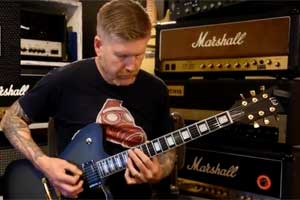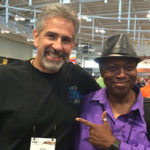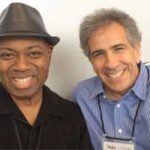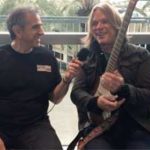Mastodon guitarist talks about power, process and the group’s new album
By Gary Graff
March 31, 2017
Since stomping out of Atlanta in 1990, Mastodon has tromped its own distinctive and idiosyncratic course through the heavy rock world. During that time the quartet has released eight albums, including the brand new Emperor Of Sand, straddling the underground and mainstream with tracks such as “High Road,” “Oblivion,” “Just Got Paid” and “Curl Of The Burl, as well as “White Walker” for the Catch The Throne Vol. II soundtrack. The group — guitarists Bill Kelliher and Brent Hinds, bassist Troy Sanders and drummer Brann Dailor — has also netted three Grammy Award nominations along the way. Emperor Of Sand gives the group fans more of what it likes most, a big, brawny sound with plenty of intricate guitar interplay. We caught up with Kelliher during a pre-release trip to New York to get our feet in the sand…
FGPO: Was there a creative goal or mission for Emperor Of Sand?
Kelliher: Not consciously. I always want the next record to outshine the last one and be better than that. So creatively, yeah, but it’s not really something that’s talked about, like: “OK guys, let’s huddle. This record we’re gonna put in more chugga-chugga” or “We have to play more solos” or “We’ve gotta have a catchier hook. We gotta have hits.” We don’t really work like that. We just try to write for ourselves and hope for the best, I guess.
FGPO: Mastodon is, of course, a guitar band and you’ve set a certain mark for that. So there are expectations for each new album — and pressure?
Kelliher: It’s not really a conscious thing, but subconsciously, yeah. I always want to outdo my work on the last record. I always want to steer into a little bit of different waters with my guitar playing and try to impress the other guys. So every time I write a riff, I want the other dudes in the band to hear it, and if they don’t turn their heads and listen for a second or don’t seem very interested, I kinda move on and keep writing until I do see people’s heads turning and some sort of acknowledgement.
FGPO: You could drive yourself crazy, no?
Kelliher: [laughs] That’s a good question. I think I DO drive myself crazy; That’s probably why I’m fuckin’ nuts sometimes, and why my wife is like: “Why are you always playing the guitar? Can you put the fucking guitar down for a minute?” No, I can’t. I’m always searching for the perfect fucking riff. It’s my own form of madness, just trying to write…not the perfect song but a cool pattern of riffs. That’s my biting of my nails. I’m always playing the guitar, trying to come up with something new — which is a good thing, because it forces me to just write constantly, so I have lots of stuff to choose from.
FGPO: Is there a lot of thinking outside the box?
Kelliher: Oh, yeah. As as guitarist, I’m always trying to play something that’s difficult. I always try to move my fingers in some weird positioning. I’m always trying to put my fingers in a new position to come up with a new idea, and Brann [Dailor] will be like: “Why don’t you just relax and just strum, like, an A chord and then put a little tail on it or something?” and I do and it works great. [laughs] And sometimes there’s those moments where you’re on a roll and I’ll start playing a riff and it leads into another riff, and it’s just like: “Yeah, that sounds really cool together.”
FGPO: What were some of the “eureka!” moments on Emperor Of Sand?
Kelliher: There’s always riffs that have been around for years. Like the first song: “Sultan’s Curse,” Part A and the bridge, I had those for years, since before Once More Around the Sun, and I have old demos of me playing that riff over and over and over from, like, six years ago. It just didn’t gel back then. I didn’t have the part for everyone to sing on. So when we found that, was a eureka moment.
FGPO: You made a lot of Emperor Of Sand in your own studio, The Quarry. How did that impact on the process this time?
Kelliher: I think having the studio helped us write the record so much quicker because we would sit down there, dump out all the riffs, play drum beats to them. I could put down the bass, the guitar and double up any ideas I had and you could cut and paste, put it all to a click track and then you can take a piece of four bars and move it around — “Yeah, that part sounds cool there, let’s go with that.” So it was really conducive to our writing. It really helped us.
FGPO: How do you and Brent arrange your guitar tandem?
Kelliher: With this record, I wrote most of the riffs. When he writes the song and writes the riff, I don’t always try to play exactly what he’s playing, ’cause he and I are on totally different ends of the spectrum as far as guitarists. We don’t play the same at all. We see the same riff in two different versions. So sometimes, I’ll show him a riff that I came up with and his interpretation of the riff is completely different and it becomes the next part of the song. It was the same thing with Once More ‘Round The Sun; If I wrote a part he would try to write something over it that was different and not play the same the same thing. It’s no fun if you’re both playing the exact same thing all the time. That’s not us.
FGPO: How do you straddle the line between being different but still complementary?
Kelliher: Well, there are some riffs, like the opening riff of “Sultan’s Curse,” that we both play together, or we’ll play harmonies of each other, just to give it that Mastodon sound. But we’re always looking to play something else. I’m always looking for the harmony or something. Sometimes I’ll take the melody and play that on the guitar, match that up with the vocals. Just something different. We’re just two different guitar players; when we’re playing live, we don’t have to lock up and play the exact same thing, and sometimes, frankly, I can’t play some of the stuff he writes ’cause he writes such fucking crazy shit sometimes. Like “Capillarian Crest;” In the middle of that song he goes off on this, like, chicken pickin’ fuckin’ frenzy for, like, a minute, and I can’t play that. I probably could play it, but it would take me about a year to learn it and I’d never play it the exact same cadence and that would sound weird live. So I’ll lock up with the bass and the drums and do more percussive parts.
FGPO: How long does it usually take for a thread or conceptual center of an album to reveal itself?
Kelliher: I don’t think about it too long. I think on this one it took a couple months of us down there in the studio. The lyrics and the visual concept of what the album’s going to be all about, that comes later. It’s really “Let’s get the music written. Let’s get the feel for the record, musically, and then after Brann puts his drum tracks down, he’s feverishly working on lyrics while we’re doing guitar overdubs and figuring out what the fuck the record’s going to be about. With this record we were pretty ahead of the game with the riffs and the songs because of the studio, so we had all the songs pretty well tracked and laid out and we started putting vocal ideas down pretty much immediately.
FGPO: Are you a different lyric writer than the other guys?
Kelliher: Oh, sure. When I write a lyric, it usually goes along with what I’m strumming on the guitar, whereas [Dailor] sees it in a different way. I think that’s what makes us unique is that the drummer is in charge of most of the singing, so the lyrics and the cadence of the melodies are built off that.
FGPO: You’re back with Brendan Benson for this album. What led you in that direction?
Kelliher: Well, we knew we had a pretty epic concept, and we knew we had some really good songs and some really heavy lyrics. We’d worked with Brendan before and the stars kind of aligned. Brendan was available; he was like: “Yeah man, tell me where and when. I’ll be there.” He kind of steps in as a fifth member. He’s got really quick, fast decisions; He’s like: “This part right here. Take it out” or “This part right here, that’s the meat of the song, you want to play it again and make that the focal point.” He’s such a talented musician, too; We’d play a song and he’d be like: “I got an idea for this part. Give me a second” and he’d go play something on the piano where we never thought to put a piano on it, or he’d jump on a mellotron or grab a guitar and figure out a harmony part. He was just so full of ideas, and we really get along great with him. Looking back we probably should’ve used that guy much more.
FGPO: You’re 17 years and eight albums in as a band now. What’s your longview of Mastodon?
Kelliher: Y’know, I never really knew what to expect, from the beginning. I still kind of just live it day to day. I never imagined we’d be a band that stayed together for 17 years, but maybe some part of me did feel like this is something special and I’m just hanging on as long as we can do this. I’m really surprised that we’re still relevant. But I feel like we can do this for another 17 years ’cause we’ve still got so many great ideas. We’ve all been friends for a long time and we’ve made it this far, so why can’t we keep going?






